More than a billion people call India home, and it can feel like a pretty crowded and busy place. Travelling by myself I thought, where better to spend some time alone than lost in an anonymous sea of humanity?
Sometimes, especially when I’m trying to buy a ticket or board a train it seems like all one billion people are trying to do the same thing. Larger train stations are often packed with crowds; families sleeping on mountains of baggage, washing up under public taps, preparing and eating entire meals.

I generally try to turn a blind eye to the number of rats on the tracks, and on one occasion I saw a very large pig wandering along the line. People cross the tracks on foot and jump from platform to platform, rather than climb the stairs and use the arteries of congested overhead walkways.
All that sort of thing was exactly what I found when I walked into Haridwar station to catch my train out of Rishikesh. That, and about two dozen monkeys running amok on the platform wreaking havoc amongst the passengers, stealing water bottles and food.

I sat on the ground and watched as a particularly big and aggressive monkey made a lunge at a man with a handful of bananas (although I did feel that travelling with a dozen bananas in hand is just asking for trouble).
It was late at night when I climbed down off the train at Amritsar station, in Punjab state. Crossing the street I walked to the close by Grand Hotel and checked in for the rest of the night. The Grand hasn’t got much to do with being grand, but it is comfortable and clean and I needed a good sleep. I also needed to eat but when I came back out into the lobby the desk clerk waggled his head ominously at me and stepped in front of the door. ‘No ma’am’ he said ‘It is risky for single ladies.’ I figured he was right – it was almost midnight – so I decided it wouldn’t kill me to skip my third curry of the day and go to bed hungry. Mainly I was just glad he’d called me ma’am – I’ve been addressed as ‘sir’ disturbingly often lately.
In the morning I moved into a more central hotel near the Golden Temple, Amritsar’s star attraction. I had a pink-painted room that looked down onto a busy street and despite deafening noise at almost all times (and an absolute lack of grandness) I liked it a lot.

I’d wanted to see the temple for years and it was the main reason I’d come, but Amritsar itself captivated me quickly and I spent an entire day just wandering in a couple of pedestrian-only streets, watching people.
Streets designated for foot-traffic with no motorcycles, auto-rickshaws or any other honking sputtering shrieking conveyance seemed a new concept to me around here. The wide promenade sweeping up to the temple’s marble compound is lined with shops and restaurants and swarming with people out to shop, stroll, and eat.

And as if to make up for the ban on vehicles on the promenade, a maze of side streets snakes out on all sides and the skinny alleys are almost completely blocked with traffic.



Everyone else seemed to be eating and I wanted to join them. First, I snacked in the side streets. Punjabis take an almost obsessive approach to deep-frying.


Munching on gobi pakora (battered and fried cauliflower) I watched as a kid plunged a burger made of a vegetable patty sandwiched in a thick roll into a vat of sizzling oil.
Next, I went for dal makhani – a Punjabi curry made of black lentils and kidney beans swimming in a buttery, creamy sauce. With a buttery chapati (flat bread) on the side, of course.

Every day for breakfast I ate an Amritsari kulcha – a crispy fried flat bread stuffed with spicy mashed potatoes, crunchy coriander seeds and onions – and topped with more coriander seeds, green peppercorns and the inevitable generous globs of butter.

Basically, the trick to eating in Amritsar is just to remember that whenever you think you’ve eaten the richest, fattiest thing possible – you haven’t. There’s always more.
And then I remembered – the Golden Temple. In my butter-induced haze I’d practically forgotten about it. But it takes only seconds in the compound surrounding Sihkism’s holiest shrine to realise this spectacular temple is unforgettable.

Barefoot and covering my hair, I waded through a shallow pool and then trying not slip on the marble, I descended the stairs. I looked at the Amrit Sarovar (or Pool of Nectar) in front of me. The water is said to have healing powers and pilgrims come from far and wide to dip in it. The brittle, gleaming Golden Temple itself seems to hover in the midst of the shimmering pool and the causeway leading to it is packed with devotees waiting to gain entry.


Inside the temple priests continually chant from the Sikh Holy Book, the Guru Granth Sahib.
The compound also hosts a massive dining area which feeds around 100 000 people a day, for free, in accordance with Sikh principles of charity and service.
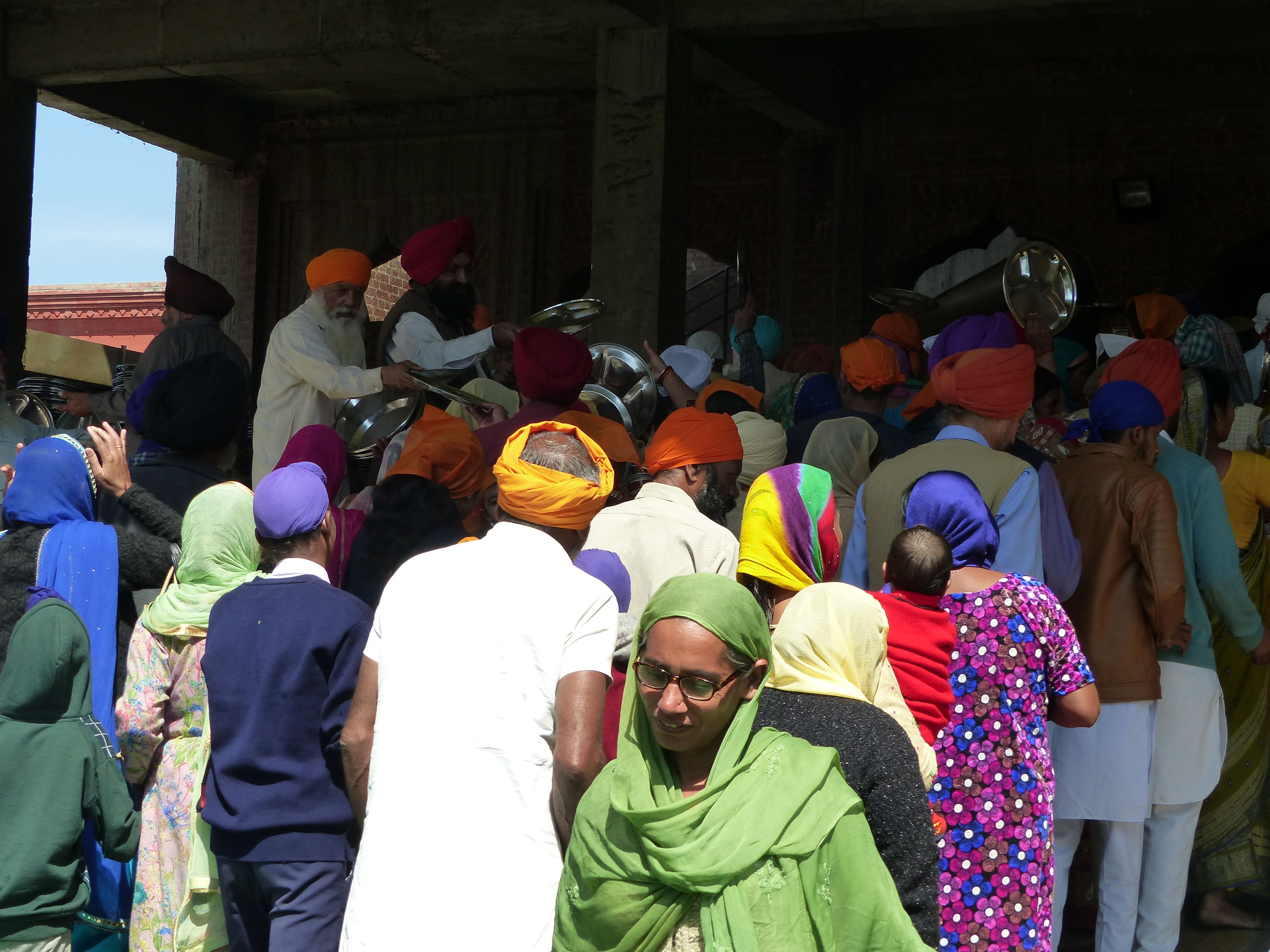
And of course, as at any other tourist attraction/religious site in India, there is no shortage of people here either, and the presence of a foreigner will inevitably lead to family photo shoots.
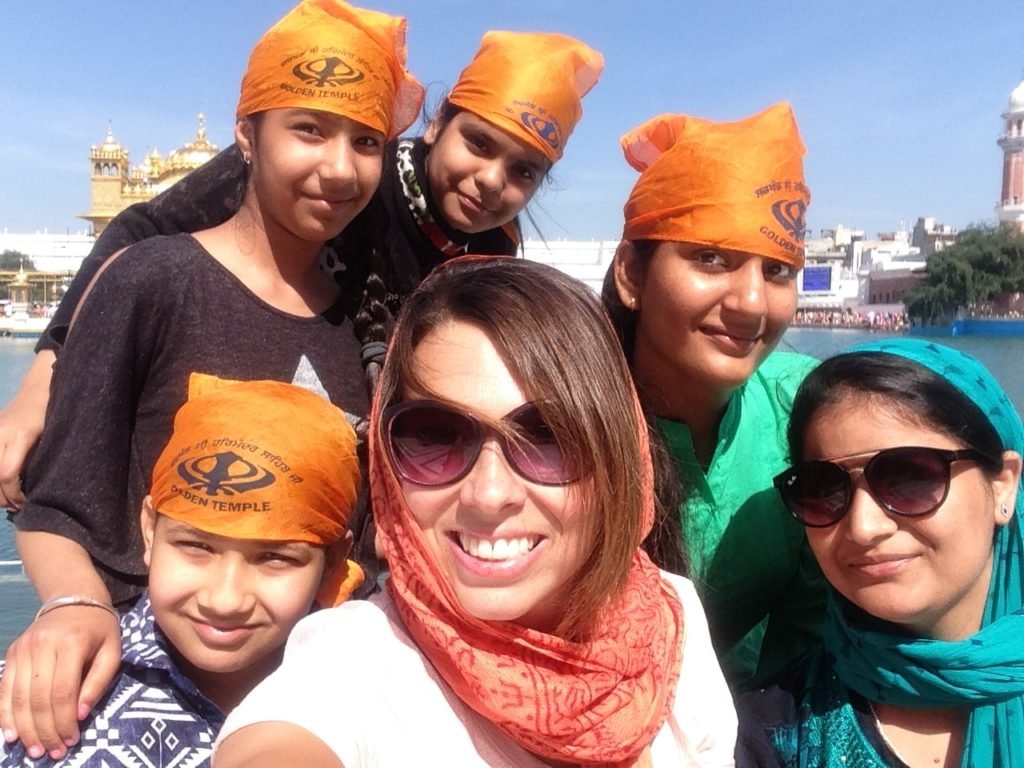
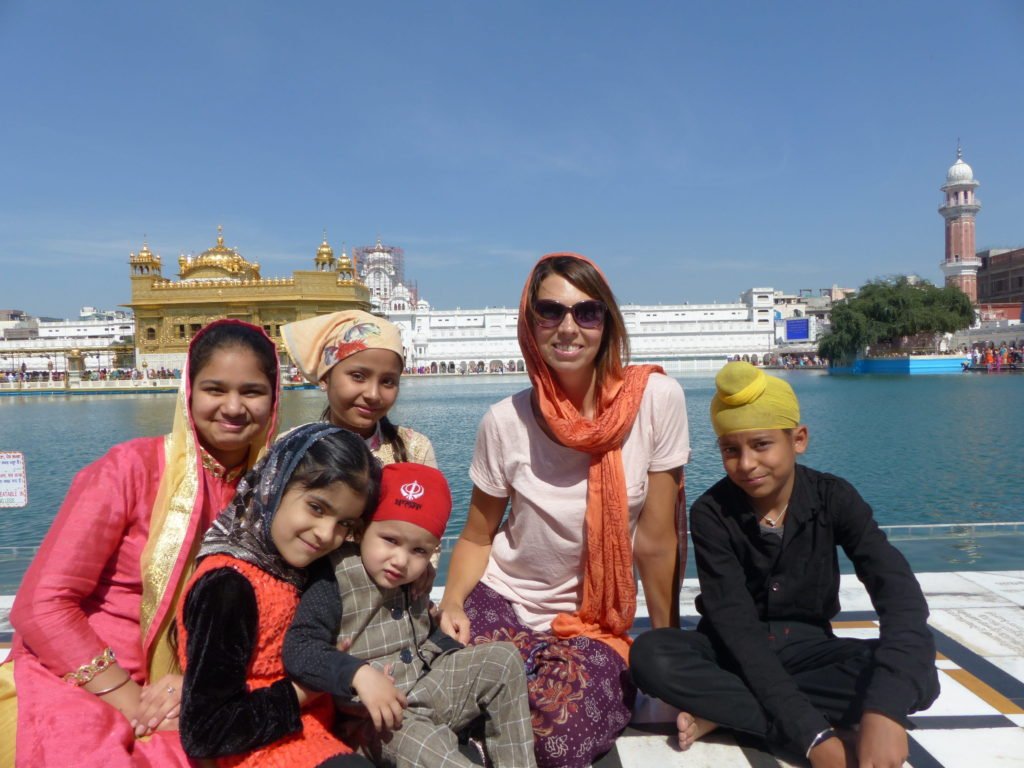
I revisited the temple late in the afternoon and sat next to the water, looking at this shrine that has stood here serene and unchanging since 1577, while an ever-growing city springs up around it.



At first glance it can seem like there is never a moment of peace in India. But even immersed in the sea of people around a place like the Golden Temple or lost in the frantic side streets, I’ve found that when I’m by myself in the crowd any moment can still just be mine if I step back and look for it.
Read More
For more of my adventures (and misadventures) in India, check out the rest of my stories from the road.

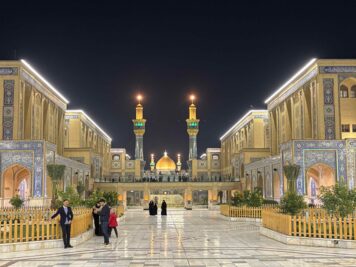
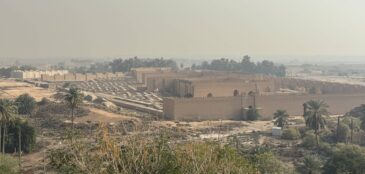
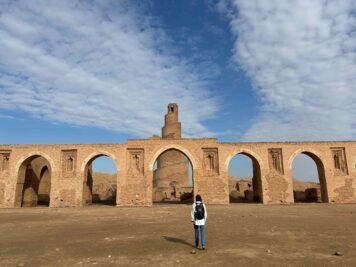
This Post Has One Comment
I so enjoy reading about your travels. And here I thought that you were home and finished for a while.
Corrine